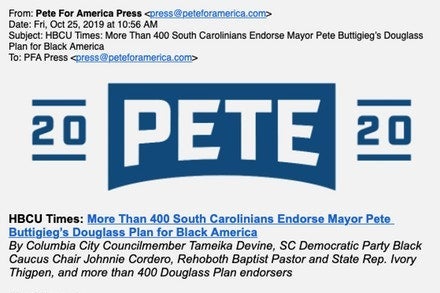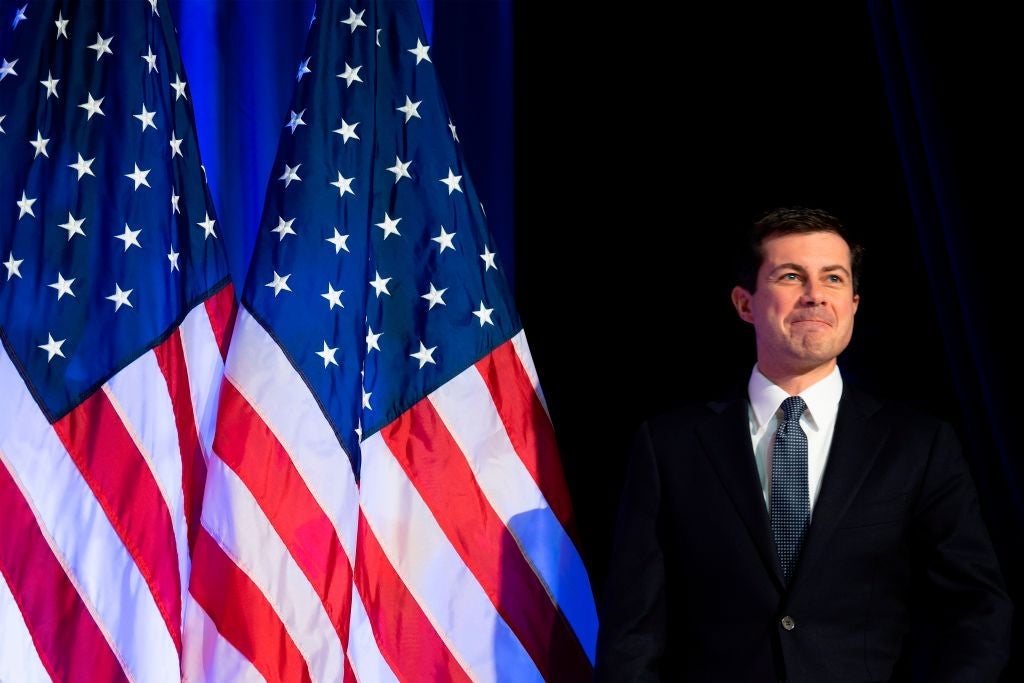On Oct. 25, Pete Buttigieg’s presidential campaign released the following:

The link goes to an article in the HBCU Times—HBCU stands for historically black colleges and universities—which is credited to the three prominent black South Carolina figures above “and more than 400 Douglass Plan endorsers.” The article praises the Douglass Plan’s proposed spending programs and legal reforms, arguing that “there is one presidential candidate who has proven to have intentional policies designed to make a difference in the Black experience, and that’s Pete Buttigieg.”
The political usefulness of such a document is obvious for Buttigieg, who is polling very poorly with black voters both nationally and in South Carolina, which holds the fourth Democratic primary/caucus and has a majority-black Democratic electorate.
A problem: When the Intercept dug into the endorsement, it found that two of the three top-line black politicians listed say they never endorsed the Douglass Plan, and that at least 40 percent of the other 400 individuals whose names are listed are white.
Here’s what state Rep. Ivory Thigpen said:
Even though I had had conversations with the [Buttigieg] campaign, it was clear to me, or at least I thought I made it clear to them, that I was a strong Bernie Sanders supporter—actually co-chair of the state, and I was not seeking to endorse their candidate or the plan. But what I had talked about was potentially giving them a quote of support in continuing the conversation, because I do think it’s a very important conversation.
And Johnnie Cordero:
“I never endorsed that plan. I don’t know how my name got on there. No, that’s not true: I know how my name got on there,” Cordero began, before explaining that Buttigieg had emailed him the plan and asked for feedback, which began a conversation with Buttigieg’s staff.
“I had some difficulties with it,” Cordero said. … “The long and the short of it was they never sufficiently answered my questions, so I never actually endorsed the plan.”
Buttigieg’s campaign, according to the Intercept’s Ryan Grim, said that rather than asking individuals directly to sign their names to the article, it merely gave those whom it considered to have endorsed the Douglass Plan the chance have their names removed :
The ethics of such a Big Tech–style opt-out approach aside, Cordero and Thigpen’s quotes indicate that the Buttigieg campaign and its “endorsers” may not have agreed on whether they were in fact “endorsers” at all.
And while you’ll note that the Buttigieg release above merely implies that the people endorsing the plan are black, a sharp-eyed Twitter user noticed that the email the campaign sent about the article to its signees claims that the 400 supporters involved are “black South Carolinians.” When the Intercept matched the names of the alleged supporters with publicly available information about South Carolina voters, though, it found that at least 184 of them are white.
Buttigieg, meanwhile, is rolling out TV ads in South Carolina that tout his military experience. He is currently at 4 percent in the Real Clear Politics polling average for the state, 31 points behind Joe Biden and 0.5 points behind billionaire vanity candidate Tom Steyer.
Update, Nov. 15, 2019, 2:54 p.m.: The Buttigieg campaign responded in a statement:
Our campaign is working to build a multi-racial coalition, and we sought and received input from numerous Black policy experts and advisers to create a comprehensive plan to dismantle systemic racism: the Douglass Plan. We asked a number of Black South Carolinians, as well as South Carolinians from many backgrounds, to support the Douglass Plan, and we are proud and grateful that hundreds agreed to do so.
In the HBCU Times op-ed and in communications with the press, we’ve been clear that not every supporter of the plan is Black, and have never claimed otherwise in any public communication. We never gave the impression publicly that these people were endorsing Pete, only that they supported the plan. After they indicated their support, we reached out to people multiple times giving them the opportunity to review the language of the op-ed and the option to opt-out. We did hear from people who weren’t comfortable being listed and we removed them.
Pete will continue to talk about the Douglass Plan wherever he goes, regardless of the audience, as there are many communities of Americans committed to eradicating racial inequity.
